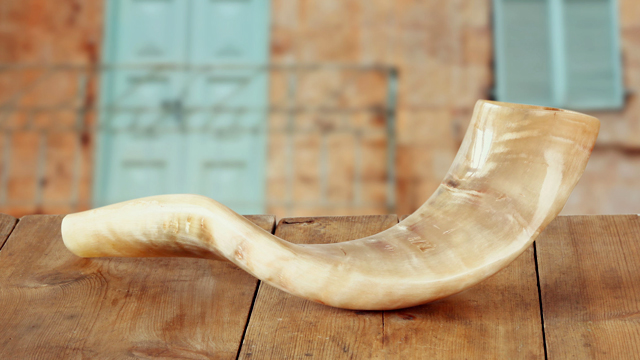
The month of Tishrei (Libra) begins this Sunday night.
This is not only Rosh Chodesh but Rosh Hashanah. This month is so different from all other months. For one thing, none of the rituals of Rosh Chodesh take place this month. It is also the only month so full of holidays–21 days of prayer, celebration, and connection. What is the message for us in this? What is this foundation that we are building?
It is interesting that Rav Ashlag says it is difficult to understand the Infinite with a finite mind. He cautions us in our effort to paint pictures with our imagination of what is taking place in the Upper Worlds as undoubtedly we will impose limitation rather than understanding. And yet he says without the knowledge, without the study of the breadth of the Upper Worlds and the spiritual dimension, we cannot begin to have awe for the greatness of the Creator, and the wonder that He has created for His creation.
Technology has provided us, as society, an experience that in some small measure simulates aspects of the many layers of Creation. We can now comprehend the phenomenal expanse and capacity of algorithms that influence every aspect of our known lives. We idolize those who created them; we talk about them, we seek to learn their next move, we want to know what they think about and what they are doing. Imagine if we began to seek God and His spiritual technology with the same passion and respect. That is what the study of Kabbalah aims to do—to expand and deepen our understanding and, therefore, our love of God and all the diversity and precision of His Creation.
Rosh Hashanah and all the holidays that are built into this month are some of the most sophisticated aspects of God’s algorithm. And as it should be, for they are the preparation, the blueprint, the sealing and foundation of life and destiny for each individual and the world. Can we really begin to fathom all that? It is the technology to build a total and complete life.
I will do my best here, as Rav Berg did all those years, to summarize the opportunity that is now before us: These awesome, magical 48 hours that have been woven into the fabric of the universe to assist us to receive all the fulfillment that is our birthright.
Let’s, as always, start with the simple understanding of what is known of this day, and add layer-by-layer all that Rosh Hashanah is and offers.
Rosh Hashanah is referred to as Yoma Arichta, the “long day.” For Rosh Hashanah is not considered a two day holiday but one long extended 48-hour day.
Rosh Hashanah begins the seventh month. What do we know about the number seven? It is written that all sevens are beloved above: God blessed the seventh day; the sabbatical year is sanctified; and among the months, Tishrei is the most precious as God placed all the holidays in this one month. Abraham, Isaac, and Jacob were all born in the seventh month. On Rosh Hashanah, the redemption from Egypt began, though it only manifested at Pesach.
Rosh Hashanah is a time of concealment. All that happens during Rosh Hashanahseems to have the element of concealment, and we know from a kabbalistic point of view that what is concealed is blessed as it is hidden from the eyes of Satan, so to speak. Rosh Hashanah falls when the moon is concealed, unlike other holidays. It is said that on Rosh Hashanah, the moon (Malchut) diminishes herself, and so we do not recite the Blessing of the New Moon on the Shabbat before the seventh month, to conceal the Day of Judgment from Satan.
It is taught to us, by the sages, that on Rosh Hashanah, God completed Creation, culminating in the creation of Man. And ultimately on this day, each and every human being is judged for all of our actions, and everything that will take place in our lives in the year to come is recorded.
As it is written in the Talmud: The eyes of God are upon it from the beginning of the year until the end of the year. They pass him one by one, one after the other He scrutinizes them all with a single glance. He created all of their hearts together and understands all of their deeds.
In the Heavenly journal there are three ledgers that are opened on this day: One for the entirely wicked, one for the entirely righteous, and one for those in the middle.
As we understand, the wicked are immediately sealed in the Book of Death, those who are righteous are immediately written in the Book of Life, and those in the middle are held in the balance between Rosh Hashanah and Yom Kippur. If we merit, and our lives will mean something for those around us or for the world, then we are inscribed in the Book of Life. But if we do not have the merit, God Forbid, meaning there is no possibility for us to change, we are inscribed in the Book of Death. It is said that on Rosh Hashanah we are not judged for those negative things we did, but rather for the potential within that we did not reach. If we are still able to move towards that potential, we are given life.
The righteous are considered those whose merits are greater than their transgressions, the wicked are whose transgressions are greater, and those in the middle are balanced, beinoni. We should all consider ourselves as the middle, and seek to tip the scales for all. For that is our work in this world; we were not created to be perfect but rather we are meant to seek our own possibility, and in striving for it we continue to grow.
On this day, we should not repent for the actions of the year past. As we stand at Rosh Hashanah, the Day of Judgment, we should consider how we would like to be transformed, and start to see ourselves, and behave as if, we have already been made anew?
How is it possible that we can be transformed? What is taking place that allows us to be new?
Rav Berg tells us that “not the Shofar or the prayers are the true focal point of Rosh Hashanah. These are simply a means of achieving ‘sawing.’”
What is this sawing?
We have a physical body and spiritual body (which is not the soul). The soul and the spiritual body are able to become separated from the physical body on Rosh Hashanah. In this way, our inner essence can be rid of its exterior clothing. This is what the kabbalists mean when referring to the spiritual term “sawing.” Please know that all of this takes place on a metaphysical level, beyond our capacity of experience. When this happens, the body and the negative actions that it committed as a result of our Desire to Receive for the Self Alone undergo a process of death. Without the soul, a body is simply a lifeless shell.
According to kabbalistic teaching, when Satan, the prosecutor, stands before the Supernal Courts to list all of a person’s sins, all he can see is a body without life; for the soul and the spiritual body are concealed from him by this process of sawing. Once this viewing takes place, Satan withdraws, disregards the person before him, and moves on to the next case. Thus, Rav Isaac Luria (the Ari) explains that we are saved from the eyes of the prosecutor on the Day of Judgment. This is what all the prayers, the blowing of the Shofar, and the special intentions are for. In the process of sawing, our true inner self is separated from our Desire to Receive for the Self Alone that was the cause of our misdeeds. What a tremendous and powerful gift. So profound and expansive and beautiful is the spiritual system the Creator built for us so we have all the support to return to a new body, a new physical life.
With all that said, what is most important to keep in our hearts and not to become overwhelmed with the details, is the simple appreciation and joy of God’s goodwill towards humanity on this day. For God’s ways differ from the ways of Man. Man judges a loving friend with good will and mercy, and an enemy with anger and strict justice. How often do we think, “Oh he got what he deserved.” But God does otherwise, He judges the entire world, even His enemies, with only good will.
This is the affinity we want to strike with the Creator on this day. To achieve a level of consciousness of mercy, of loving one another. For in doing so, we can create miracles.
This infinite and overwhelming gift comes to us for this 48-hour period. Tilting the scales for the world only requires one united bonded community, with a single laser vision to, above all and no matter what, stand together one soul, one mind, one heart, and let nothing come between us so that we can create for ourselves and the world a year of peace, harmony, love, total fulfillment.

